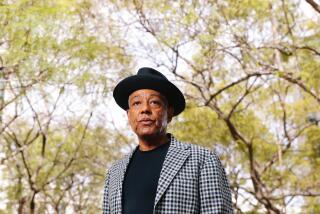A Place in a Parallel Land
- Share via
To live in Los Angeles is to understand that we inhabit two nations: one with papers and one without. In the former nation, people are born, schooled, hired, married and buried along a peaceful trajectory. In the parallel nation, nothing is certain. Nothing is yours.
The baby sitter’s son was a member of that latter nation; he had been since they brought him from Guatemala at 7 years old. No one spelled it out for him, but he knew he was different; not many second-graders can tame wild monkeys and use a machete to cut the grass.
Children don’t like being different. The boy worked hard to learn the ways of his new world: How to dress. How to keep his eyes from meeting the eyes of gangbangers. How to salute the flag and not have the words come out: “I PLAY-sia-lesions”. . . . How to baby-sit himself until mom came home.
And, above all, how to keep quiet, because for outsiders in America, the rules are particularly hard. Know your place, his mother told him. And at first that was easy. Their place was with the legions of outsiders like them, on the wrong side of the parallels.
*
Years passed. The boy and his mother moved to the suburbs. Again, there were lessons to learn. How to ride a skateboard. How to fend off girls. How to get used to the songs of the crickets in the sudden quiet of the night.
They were less poor now, though his father was living across the country and his mother was raising him alone. She had gotten her papers, found her way to that better nation, and, with her green card, found a better job.
The boy, too, was going to get papers. His father had promised. He had paid good money to a notario downtown. Life was improving. Still, nothing was certain and the boy kept quiet. Keep your head down, he told himself. Remember your place.
The only trouble was, that place was suddenly uncertain. At home, he spoke Spanish, but in his dreams, he talked like an American. Sometimes, he felt like a typical adolescent who had this one particular hazy memory, this exotic childhood.
One day in middle school, something confusing happened. The teacher had issued some edict, and a kid in the back joked, “Oh, no you don’t! We have our rights!” He was a white kid, a class clown, and the way he said it was funny. Another kid joined in, and then another, and soon the boy found himself shouting as well: “We have our rights! We have our rights!”
The baby sitter’s son yelled without a trace of his old accent. His jeans and T-shirt were just like the other boys’. His dark hair, smooth as a crow’s back, fell over his forehead just like theirs did. The brown hand that pounded his desk was as strong as theirs.
It dawned on him that he was no longer all that different. How could he be, when he felt so alike? He forgot to keep quiet, and when the joke was over, he had a strange feeling. He asked himself: Who are you? What is yours? What is certain? What are your rights, what is your place in this parallel land?
*
All men, it is written, are created equal. This is the most basic lesson we teach ourselves in America. Years continued to pass, and for the boy, they only brought more questions. If we are born equal, he wondered, how can we “know our place?”
His mother understood the answer: For without papers, there is no equality. She complained to the boy’s father that the notario still had not acquired the boy’s green card. Soon he would be 18, when the laws could punish him as a man.
By now, she, too, was beginning to question. Why, she wondered, had she relied on her ex-husband? Why had she believed the legalities were not her responsibility, her place? In the years she had remained quiet, allowed her son to languish in the parallel nation, the rules against outsiders had hardened; where once there’d been hearts, there was now stone.
And yet, what could she have done differently? Rights, responsibilities, you can’t know them unless you know you are equal, and that knowledge doesn’t come overnight--not for anyone in any of our nations, nations of men and women, of adults and children, of insiders and outsiders, of haves and have-nots.
Now, unless she acted quickly, her son could be deported. She would have none of it. She rose up, found a real lawyer, tapped every friend she could find. The process was byzantine and harrowing, but she got the papers. She managed to bridge the parallels.
Today, the baby sitter’s son is preparing for college, and his mother is thinking about going back to school. I don’t know what language they dream in, but it has been a long time since either talked about knowing their place.
All I know is that as our treatment of outsiders becomes ever more impatient and ever harder, as our wedge politics become ever more cynical, their story seems to say something valuable about these nations we maintain. Something about equality, and the time it takes, and the way people blossom once they’ve found it, and the way, once they’ve found it, they cannot be denied.
Shawn Hubler’s e-mail address is shawn.hubler@latimes.com
More to Read
Sign up for Essential California
The most important California stories and recommendations in your inbox every morning.
You may occasionally receive promotional content from the Los Angeles Times.












